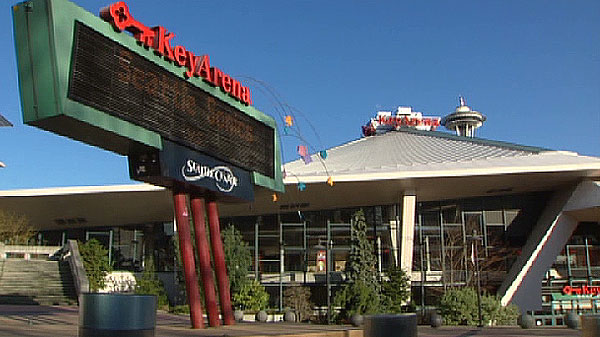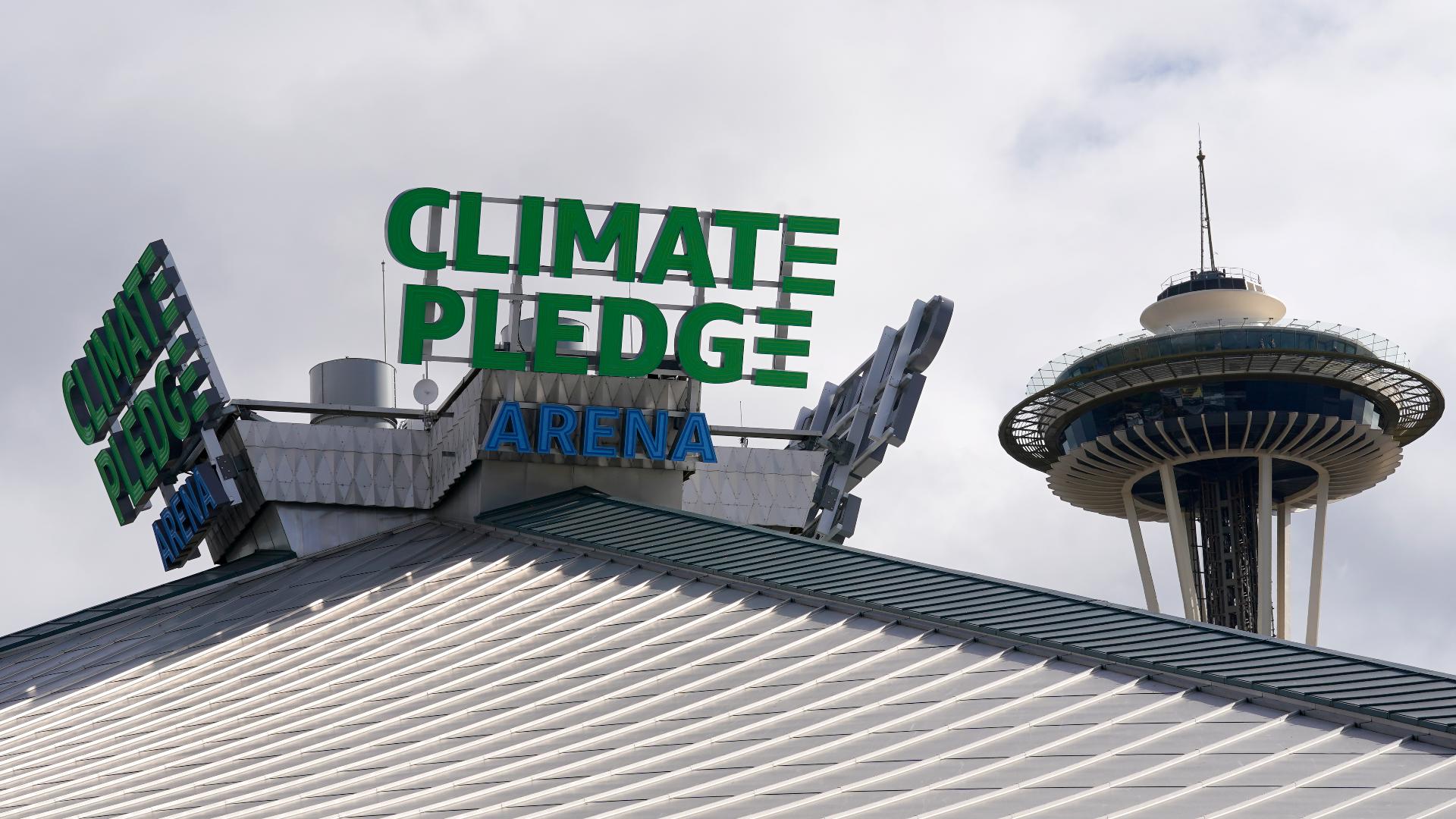Port of Seattle Commission President Tom Albro has a financial interest in the future success of Key Arena, a fact that forced Albro to recuse himself from all conversations on two competing proposals to bring professional basketball and hockey back to the city.
Albro not only sits on the port commission, but also owns Seattle Monorail Services, which has a 10-year contract to run the Seattle Monorail. Albro’s company signed a deal with the city in 2014.
That relationship is sure to raise eyebrows given the current debate about whether a remodeled Key Arena would be a better home for professional basketball and hockey teams, instead of a completely new arena in a different part of town.
Proponents of remodeling Key Arena have cited the Monorail as a way to ease congestion that would be caused by multiple sporting events drawing large crowds to Seattle Center. The Monorail has stood since the 1962 World's Fair and is a registered historic landmark. It turns 55 on Friday.
Tim Leiweke, whose Oak View Group is expected to bid on the Key Arena project, told the Seattle Times last week that the Monorail is a "great, unused opportunity." Similar comments from Mercer stakeholders at a recent meeting suggested its use could be "incentivized” – such as providing discounts to encourage more people to use the service.
Increased Monorail ridership would directly benefit Albro’s company. City documents show that Seattle Monorail Services LLC gets a share of net operating income from the Monorail's activity, in exchange for operating the mile-long service.
"Each Contract Year during the Term the Concessionaire shall pay the City, an annual fee (“City Concession Fee”). The City Concession fee shall be the greater of two-thirds (66.67%) of Net Operating Income for the applicable Contract Year or Five Hundred and Fifty Thousand Dollars ($550,000) (the “Minimum Fee”). The Minimum Fee shall be adjusted as fares are adjusted from time to time in accordance withSection XI.F.1. and prorata with the change in the blended average fare (total Ridership Revenue divided by the total number of riders). In no case shall the Minimum Fee be less than Five Hundred and Fifty Thousand Dollars ($550,000)."
The Monorail’s operators proudly proclaim that the short stretch, connecting Westlake Center and Seattle Center, carries two million passengers a year. Tickets currently run $2.25 for adults, and $1 for kids one way, although a price hike is proposed to go into effect May 1.
According to the City of Seattle, Albro's company made $437,436 in 2016 and $469,920 in 2015.
Supporters of remodeling KeyArena note that the Monorail can connect riders to the existing Link Light Rail and the Seattle Streetcar at Westlake Center, as well as King County Metro’s extensive bus network that runs nearby.
However, there is a not insignificant gap separating the Sound Transit line and the Monorail, and the Monorail’s historic designation would trigger a lengthy process to obtain approval for construction to close that gap, according to Seattle's Department of Neighborhoods spokesperson Lois Maag.
It is a fair bet the "Monorail solution" argument will be repeated after KeyArena remodel proposals are turned in to the city on April 12, and it is only a question of how much Albro will play a part of it.
Albro, in a lengthy conversation with KING 5 on Friday, acknowledged the potential conflict of interest and said that’s why he recused himself from any conversations on the KeyArena.
“I believe integrity is the most important thing for elected officials, and I have high standards for myself and I expect others to do the same,” he said.
Albro pointed KING 5 to an email he sent in January because, he said, “I need to formalize this, because it’s a real possibility.”
The email shows that Albro wrote his fellow port commissioners on January 24 to tell them he needed to excuse himself from any future conversations on KeyArena.
He wrote:
As the City of Seattle engages in its effort to evaluate possible refurbishment of Key Arena as a modern and attractive venue for NBA, NHL, concerts, and events, it creates a situation that causes me a potential for a conflict of interest. If the Port (at the commission or staff level) is approached by the City to be supportive or if there is a desire by the Port to be so or consider being so, I must not be part of that conversation and will recuse myself from it.
My personal financial interest is best served by Key Arena being renovated and hosting basketball, hockey, and becoming Seattle’s premier concert venue. My role, as the City’s concessionaire operating the Seattle Monorail – since 1994 – requires that those reporting to me support the City’s effort to promote the recently issued Key Arena RFP and the fair evaluation of coming responses. I too, as the owner along with my wife Tina of the monorail operating company, will engage directly in efforts to inform potential respondents and reviewers the capacity of the Seattle Monorail toaddress the transportation demand that would come from a refurbished Key Arena. I will not do so, however, in any public way. Instead, another from my company will be the monorail spokesperson.Therefore, I must recuse myself from all Port conversations that pertain or could pertain to Key Arena. To effect that, I will not engage with any Port staff member in any discussion that involves the Key Arena. Further, I will recuse myself from the dais at any public meeting and turn the meeting over to the Commission Vice President if and when the Key Arena comes up as an agenda item. I will not influence, positively or negatively, any consideration as to whether it be an agenda item for Commission discussion/consideration. I instead leave those decisions that would normally be made by the Commission President to the Vice President.
If, for some reason, there is public testimony before the Commission that pertains to Key Arena I will do my best to group those speakers together and turn the gavel to the Vice President and step away from the dais while the speakers provide their comments.
While I have a conflict of interest when it comes to the consideration of Key Arena, I do not have a conflict when it comes to discussing the damaging impacts of a new arena in Seattle’s industrial area and near Terminal 46. In fact, I have plainly and forcefully spoken against such a possibility since it was first proposed (2011?). I did so without reservation or regard to the fact that doing so put me at odds with Seattle’s mayor at the time – the person to whom the individual overseeing the monorail concession agreement directly reported.
I will continue to speak against such incursions into industrial lands when it serves the Port’s public purposes. That said, I am mindful that any comment I offer now that Key Arena has been put on the table, could easily be marginalized by those promoting gentrification of industrial lands by simply pointing out my personal interests.
Therefore, I think it wisest for others to be the primary torch-bearers when it comes to opposing the proposed job-killing SODO arena.
Finally, I am soliciting any suggestion you have that would further insulate the Port and me from any negative consequence of my conflict of interest.A Port of Seattle public records search, using the term "KeyArena," shows that Albro is closely tracking the potential KeyArena renovation.
Julie Collins, the Port of Seattle's senior director of public affairs, wrote on October 27 to LeeAnne Schirato:
"I spoke this morning with Commissioner Albro about having a touch base meeting with him regarding developments on the proposed arena.
"He very much wants to connect with the PA team and indicated this would be a priority for him."
Schirato is the Port Commission's executive assistant, according to her LinkedIn Profile. The email came on the same day Seattle Mayor Ed Murray announced the city would seek bids for remodeling KeyArena.
Another search of "KeyArena" in the Port of Seattle public record database shows a series of emails, dated October 28, a day after the mayor’s announcement. Those emails, carrying the subject line "KeyArena and the Port?," are heavily redacted. The Port argued that the emails are protected from release by attorney-client privilege.
Albro said he could not recall what those emails were about, but that once he had a sense a KeyArena project could become a reality, he felt compelled to address the conflict.
“When the City issued the RFP for Key Arena, I thought 'Oh God! These two things are going to collide,'” he said.
The Port of Seattle and a coalition of unions and other business interests have fought plans to build a new arena in SoDo, arguing that the resulting traffic would disrupt cargo and freight operations and snarl traffic for other landowners.
Albro, as head of the port commission, helped lead the charge against investor Chris Hansen’s plan to build a new sports arena in SoDo. At an April 2016 Seattle City Council meeting, Albro said the Port would "resist any action on this, in every way we possibly can."
That same month, in a roundtable discussion on the Seattle Channel, Albro was asked by an interviewer about KeyArena. Albro, responded, in part an economic and infrastructure study concluded "KeyArena is a viable alternative" for hosting a return of professional basketball and hockey to Seattle.
And leading the port commission gives Albro regular access to city officials.
For example, Albro led a Seattle delegation to Hamburg, Germany, in December to inspect port operations there. Joining Albro were four Seattle city councilmembers: Debora Juarez, Sally Bagshaw, Tim Burgess and Lisa Herbold. All four councilmembers paid their own expenses (SDOT Director Scott Kubly was also part of the delegation). Juarez, Bagshaw and Herbold all voted last May against a critical piece of the Hansen plan to build a SoDo arena – the vacation of a stretch of Occidental Ave. S.
The Seattle City Council is expected to take up the arena issue in the “Select Committee on Civic Arenas” on Monday at 10:30 in Council Chambers.


